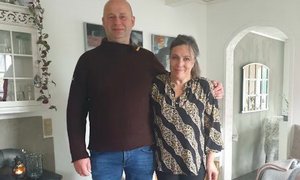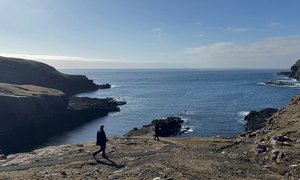David Hartley, Orkney
Orkney nights have been lit by a dramatic orange glow for the past 25 years - a sight as familiar to residents as the stars that fill the clear skies above the islands.
Islanders treasure the winter spectacle of the aurora borealis. But the source of this night time display is man made - and serves as a powerful symbol of the impact oil has had on the Orkney Islands.
A huge orange flame has blazed above the Flotta Oil terminal for almost a quarter of a century now. It can be seen on clear nights from the Scottish mainland and is generated from waste gases produced as crude oil delivered by seabed pipeline is processed at the terminal.
North Sea oil abruptly arrested many decades of decline - and began a remarkable transformation of the islands' economy - when it first arrived in December 1976.
Today it is difficult to envisage the excitement of residents - particularly those living on the tiny island of Flotta - when news broke that Orkney was to benefit from a massive oil boom.
To taste a flavour of the mood in the islands, look no further than the film Local Hero, a huge hit in Britain when it opened in cinemas across the country in 1983.
One scene in particular struck a chord with people here. The Hollywood star
Burt Lancaster steps out of a helicopter on to a remote Scottish beach. Playing an American oil tycoon called Felix Happer, he announces: »Now I'm here I think I'd like to organise a presentation. Something these people might need like a church hall ... or a piano.«
Six years before Bill Forsyth wrote and directed Local Hero, an American oil tycoon called Hammer - the legendary Dr Armand Hammer - had watched with pride as the British Government's Energy Minister officially opened the oil terminal on Flotta.
While the giant plant was being built, Dr Hammer decided he wanted to give Orkney a gift - and what better than a piano. Today, as the islands prepare to look back on 25 years of living with the oil industry, that Steinway grand piano is still being played.
It?s not known for certain whether the Flotta experience influenced Bill Forsyth. But apart from expensive musical instruments, islanders can see distinct parallels between their own story and that of the fictitious account of Felix Happer's plans to turn an idyllic Scottish bay into a massive oil facility.
One thing is for certain, though. The locals of Flotta did not get rich in the way they - and their film counterparts - had hoped.
In Local Hero, villagers relish swapping their homes for oil dollars and argue over the rival merits of owning a Rolls Royce or a Maserati
On Flotta, big money was paid for the farm land Occidental - Dr Hammer's consortium - bought up to make way for the terminal.
I heard the story of those remarkable days from farmer Danny Barnett, one of the islanders who gladly sold land for inflated prices.
»We couldn't see much of a future for small farms like mine so we didn't mind that Flotta became known as Treasure Island,« he told me.
»I don't mind saying that I expected to end up a very rich man and we certainly got huge prices for our land.«
But as he stood outside his modest farmhouse, Danny, now 75, added: »You'll notice that I'm still farming.«
»I would have been extremely wealthy today if we didn't have a Labour Government - which meant high taxes - at the time.«
»I got 83,000 (pounds) for 57 acres - a great deal of money in those days - but the Government took away more than 80 per cent in capital gains tax.«
»That didn't leave me very much - but I did invest it extremely carefully.«
Danny might not be rich. But he is happy to acknowledge that the plant and its staff been excellent neighbours - and have made a huge contribution to the present prosperity of Orkney as a whole.
The wealth the terminal has generated is difficult to calculate. The sums involve the wages paid to staff and contractors over the years, the service industries that benefit from oil-related work and the dues Orkney?s Harbours Department charges the tankers that take oil and gas away from Flotta.
But Orkney Islands Council, which has generated huge cash reserves in oil-linked income, estimates that Flotta has contributed »several hundred million pounds« to the local economy.
Hugh Halcro-Johnston, the council's convener, said Orkney was lucky that major oil developments took place first in Shetland.
»Orkney learnt a lot of lessons from the Shetland experience,« he said. »It meant that we got many of the benefits of oil developments without many of the less acceptable aspects.«
»One of the big advantages here was the creation of the terminal on Flotta, a small island well away from the main centres of population. That meant that the massive disruption during the construction phase was far less damaging to the Orkney community«
The Flotta Terminal was built to handle oil from the number of North Sea fields. After processing at the plant, oil and gasses more valuable than those that light the night sky are shipped by tanker to destinations throughout Britain and Europe.
During negotiations with the original owners of the terminal, special arrangements were drawn up to ensure Orkney benefited from becoming a major oil port.
Essentially, a range of payments is made to the islands council, which invests the money for the greater good of the community as a whole.
They have funded many economic and social projects and continue to do so. A new cheese factory is about to open and work will soon begin on a modern new library in the Orkney capital, Kirkwall. Funding for both has come from the council's oil reserves, which currently amount to almost 143 million (pounds) in total.
»There will always be some people who will think we could have done better,«said Councillor Halcro-Johnston. »But I think the deal was fair. It was within what the industry could afford and it has brought huge benefits to Orkney.«
Until the terminal opened, the population of the islands had fallen steadily from 30,000 in 1901 to just 17,000 in 1971.
»One of the most important benefits of the oil era, and one often overlooked, is the way it restored confidence in the people of Orkney,« he said. »Until the 1970s, people across the islands were wondering how long they could hang on and when they'd be forced to leave.«
»But suddenly Orkney was an important place again and the confidence that gave people in the future of these islands has benefited us enormously from that day.«
»I travel all over Scotland and everywhere I go people look to Orkney with undisguised envy because of the enterprising spirit that exists here.«
»That confidence encouraged people to start businesses and make a success of all sorts of ventures - everything from food processing and crafts to jewellery manufacture and the imaginative way we have developed Orkney's many archaeological treasures as major tourist attractions.
»It means it's difficult now for many here to remember the depression years of depopulation, the feeling that the whole of Orkney was being run down. All that has been completely reversed by oil.«
One of the important reasons for creating the oil reserves was to ensure money was available to help the islands cope with the eventual closure of the oil terminal - now projected to happen in 2020.
But Councillor Halcro-Johnston thinks that goal has largely been achieved, often through the injection of some of those reserves into economic development projects.
»The work has almost been done,« he said. »There are now so many businesses in Orkney that are growing and doing well. They provide us with the basis for future prosperity.«
Traditionally, Flotta itself has put huge amounts of cash directly into the Orkney economy by paying people big salaries they in turn spent on local goods and services.
Under new management determined to cut costs to keep the ageing plant viable, the story is different today and the workforce stands at just 165.
But at the height of the oil boom, around 450 workers were employed directly or indirectly by Orkney's oil industry, many of them building new and often lavish houses. »Flotta homes«, as they are known, have become landmarks in their own right and will one day stand as monuments of a prosperous era in the islands' history.
»At the height of activity at the terminal, it was providing well paid jobs,« added Councillor Halcro-Johnston. »And that was exactly what was needed in a community that had depended so long on fishing and farming.«
»It was also an opportunity for so many Orcadians, who had been forced to leave to find work, to come back to the islands. And that reversed the trend which had seen the Orkney population decline over the first 70 years of the 20th century.«
To date, more than 2 billion barrels of crude oil have been processed at the terminal, along with almost 49 million barrels of propane gas.
In addition, oil from the Foinaven Field, part of the new Atlantic Frontier west of Shetland, is delivered to Flotta by shuttle tanker. The terminal stores the Atlantic crude, ready for onward shipment to refineries elsewhere. So far, almost 97 million barrels of Foinaven oil have passed through the terminal.
Talisman Energy (UK) Ltd, the company that took over the running of the plant two years ago, has a reputation for aggressively seeking new business and, last year, made more acquisitions of North Sea oil fields than any other operator.
It is skilled in extending the life of fields many would consider to have reached the end of their useful life. That means Flotta is now receiving oil from more fields than at any other time in its 25-year history - and that the estimated life of the plant has been extended to 2020.
There has been considerable recent speculation among industry analysts that oil companies developing new Atlantic Frontier fields will choose to land the crude at Flotta using the shuttle tanker system developed for Foinaven. Again, this will be important business for the terminal.
Jeremy Baster, Orkney Islands Council's development and planning director, welcomes moves to extend the life of a terminal that has served so well as a cornerstone of the community's economy.
Ambitious plans have been drawn up to turn Scapa Flow - the giant natural harbour that lies at the heart of the islands - into a major terminal for container ships.
A detailed study has shown that this could create up to 2,000 jobs. The council's hope is that this will serve as prosperous business for Orkney long after the day when the oil terminal finally closes.
But the down turn in world trade since the terrorist attacks on September 11 could delay the creation of the terminal - so oil remains of crucial importance to the islands.
»Oil has given a core of stability to the employment market in Orkney and pumped in a substantial amount of income,« added Mr Baster. »Given the problems our other traditional industries - fishing and farming - are facing, it's vital we have that to fall back on.«
As the Flotta flare continues to burn above the islands, one question remains unanswered - did the story of the arrival of oil in Orkney influence Local Hero, a film that remains a favourite for many to this day.
Twenty five years ago, college lecturer Howie Firth was a local radio reporter and covered the opening ceremony at the terminal.
»I've always thought that the development of Flotta inspired Bill Forsyth when he was writing and directing Local Hero,« he said. »There are so many parallels between what happens in the film and what actually occurred on Flotta and the sense of humour that comes across is very Orcadian.«














